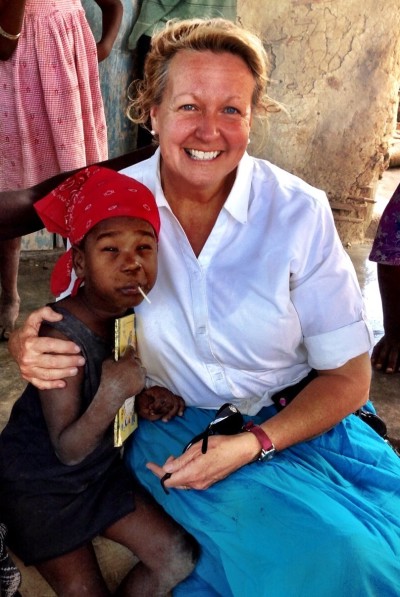Here’s what we can learn from Jesus about disability awareness

In a world where worth is often measured in terms of physical appearance, status, and success, the unconditional love that God gives to all equally without distinction is somewhat beyond our comprehension.
The Bible tells us that all human beings are made in God’s image, not the least of which are those with an intellectual or physical disability. These often-overlooked members of society deserve to be esteemed as valuable and given opportunities to live a purpose-filled life.
We should follow Christ’s example and lead the way in transforming the burdens many people with disabilities face by becoming a loving, helpful community to this precious population.
When you read the four Gospels of the Bible, there’s no question that Jesus has great compassion for people with disabilities. In the first ten chapters of Mark, there are eleven stories of Jesus demonstrating just that.
Anyone who is focused on the Lord’s work will quickly recognize how Jesus is drawn to marginalized people and communities. He had a priority in his ministry to draw near to the weak — those who are often excluded. It wasn’t uncommon for Jesus to spend time with the humble and the suffering rather than with people of wealth, influence or religious hierarchy. Whether it was the man born blind in John 9, or the individual with the withered hand in Luke 14, Jesus was moved with compassion for those with disabilities.
Sadly, in many developing nations, those with cognitive or physical impairments are thought to be victims of fate or even cursed. But to God, they are an individual with worth and dignity. In fact, the Bible says, “it’s the ‘least of these brothers” (Matthew 25:40) and “those parts of the body that seem to be weaker” (1 Corinthians 12:22) who are to be given special places of honor.
Jesus never passed by people with disabilities. He noticed and stopped to speak with them. Moreover, He met their needs and treated them as a whole person, created and loved by God. As believers, we are called to follow Christ’s example. We should recognize, embrace and include those who live on the margins of our society and show them love and dignity. We can invite them to the banquet of God’s abundant love, as Jesus talks about in the book of Luke. “Go out, find the poor, the crippled, the blind and the lame and bring them in” (Luke 14:21).
How do we model Christ’s example today?
In countries with a wealth of resources, some people with disabilities may have access to education, speech and occupational therapies, even vocational training. We celebrate that this is largely true here in the United States, as we mark the 32nd anniversary of the Americans with Disabilities Act this month. This transformative piece of legislation made schools, workplaces, stores, entertainment venues, etc., accessible to everyone, and prevents discrimination against those with disabilities.
But globally, this is the exception, not the rule. In developing nations, children with impairments of any kind are often denied access to education. They’re often disregarded or ignored entirely by society, abandoned, or placed in institutional care.
Eleven years ago, my husband and I felt called by God to sell everything we had, leave the comforts of America and move to Haiti, where we’ve been honored to serve the Lord ever since through the ministry of LiveBeyond. As we realized the significant gap that exists in providing love and support to families of children with disabilities, we established the Johnny’s Kids program — named after my brother, who had Down Syndrome.
Johnny’s Kids enrolls children from all throughout the Thomazeau region, who will then receive proper nutrition, education, and healthcare. But most importantly, they will be shown the love, attention, and care they deserve and need.
One of the overarching goals of the program is to help these precious children integrate into — and be accepted by — mainstream society. When a child joins the school, they’re empowered to experience the best in life and reach their full potential.
People with physical or intellectual differences have skills and strengths, as well as spiritual gifts that should be nurtured and developed. In most cases, they desire the same sense of autonomy and purpose that we all do. They desire opportunities to build relationships, serve, worship and work as productive and useful members of the community, reaching their highest level of independence.
If all followers of Christ will operate according to His standard of love, we can help the “least of these” achieve their God-given purpose and potential. When a society makes this commitment, it lifts the entire community. People start thinking differently and the culture is corporately transformed to become not only more accepting and inclusive, but everyone’s abilities are honored and valued and contribute to the whole.
Let's pray for a Christ-like compassion to increase in our hearts, and for God to reveal opportunities to be used by Him to meet the practical and spiritual needs of those with disabilities. We will all be the better for it.
Laurie Stallings Vanderpool is co-founder of LiveBeyond, a faith-based humanitarian organization bringing general medical care, mother and child health care, nutrition, clean water, education, and community development to people worldwide. LiveBeyond has worked in several countries, including Mozambique, Ghana, Honduras and now Israel. In 2012, LiveBeyond established a base in the Thomazeau region of Haiti, with a compound that consists of a guesthouse, a surgical hospital, a demonstration farm, a church, and a school. For more information, see www.livebeyond.org.





















